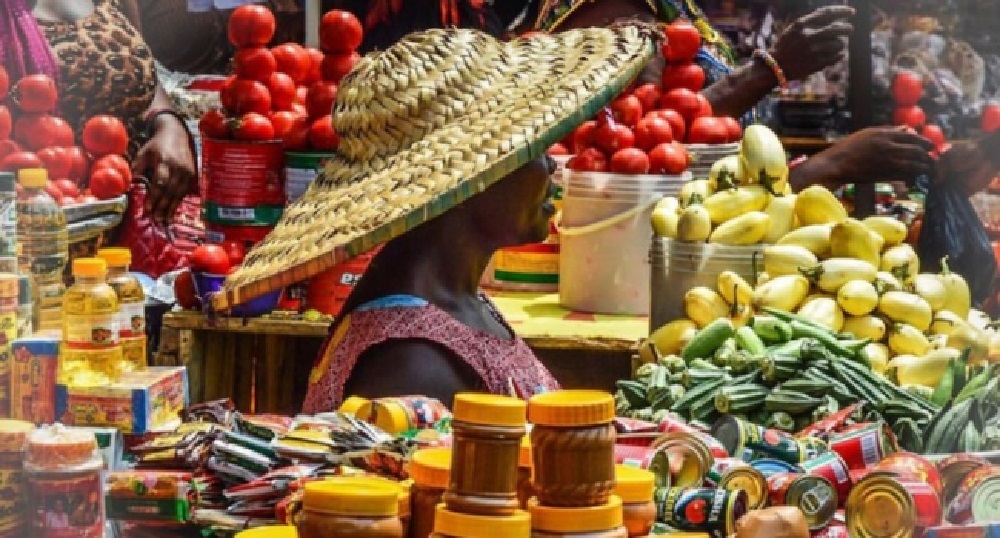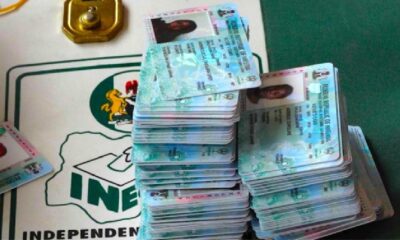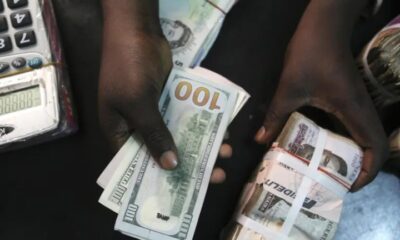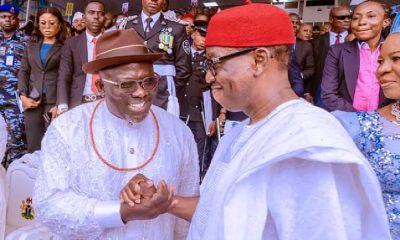Economy
IOCs frustrating rollout of petrol, says Dangote Refinery

Dangote Group has accused International Oil Companies (IOCs) operating in the country of deliberately sabotaging Dangote Refinery’s plan to roll out petrol into the market.
According to the company, the IOCs are doing this to ensure that the country remains dependent on petrol imports perpetually.
It added that they have employed underhand tactics in crude pricing and deliberately stalling supply to frustrate Dangote Refinery.
Vice President of Oil and Gas, Dangote Industries Limited (DIL), Devakumar Edwin, made this known yesterday in Lagos.
He, however, added that despite these challenges, the refinery is on its last lap of testing ahead of roll out next month.
He explained that the IOCs have raised local crude prices above the international market price, forcing it to import crude from countries as far as the United States, with its attendant high costs.
He also criticised the Nigerian Midstream and Downstream Petroleum Regulatory Authority (NMDPRA), for granting licences indiscriminately to marketers, who, according to the firm, import “dirty refined products into the country”.
Edwin said: “The Federal Government issued 25 licences to build refineries and we are the only one that delivered on promise.
“In effect, we deserve every support from the government. It is good to note that from the start of production, more than 3.5 billion litres, which represents 90 per cent of our production, have been exported.
“We are calling on the Federal Government and regulators to give us the necessary support in order to create jobs and prosperity for the nation.”
According to him, while the Nigerian Upstream Petroleum Regulatory Commission (NUPRC) has been trying its best to allocate crude to Dangote Refinery, such efforts are being frustrated by the IOCs.
Speaking further, Edwin said: “It seems that the IOCs’ objective is to ensure that our Petroleum Refinery fails.
“It is either they are deliberately asking for ridiculous/humongous premium or they simply state that crude is not available.
“At some point, we paid $6 over and above the market price. This has forced us to reduce our output as well as import crude from countries as far as the U.S., increasing our cost of production.
“It appears that the objective of the IOCs is to ensure that Nigeria remains a country which exports crude oil and imports refined petroleum products.
“They (IOCs) are keen on exporting the raw materials to their home countries, creating employment and wealth for their countries, adding to their GDP, and dumping the expensive refined products into Nigeria – thus making us dependent on imported products.
“It is the same strategy the multinationals have been adopting in every commodity, making Nigeria and Sub-Saharan Africa to be facing unemployment and poverty, while they create wealth for themselves at our expense. This is exploitation – pure and simple.
“Unfortunately, the country is also playing into their hands by continuing to issue import licences at the expense of our economy and at the cost of the health of Nigerians, who are exposed to carcinogenic products.
“In spite of the fact that we are producing and bringing out diesel into the market, complying with ECOWAS regulations and standards, licences are being issued, in large quantities, to traders who are buying the extremely high sulphur diesel from Russia and dumping it in the Nigerian Market.
“Since the U.S., EU and UK imposed a Price Cap Scheme from 5th February 2023 on Russian Petroleum Products, a large number of vessels are waiting near Togo with Russian ultra-high sulphur diesel and, they are being purchased and dumped into the Nigerian Market.
“In fact, some of the European countries were so alarmed about the carcinogenic effect of the extra high sulphur diesel being dumped into the Nigerian market that countries like Belgium and the Netherlands imposed a ban on such fuel being exported from its country, into West Africa.
“It is sad that the country is giving import licences for such dirty diesel to be imported into Nigeria when we have more than adequate petroleum refining capacity locally.”
According to him, the decision of the NMDPRA to grant licenses indiscriminately for the importation of dirty diesel and aviation fuel has made the Dangote Refinery expand into foreign markets.
He appealed to the Federal Government and the National Assembly to urgently intervene for the speedy implementation of the Petroleum Industry Act (PIA) 2021 and to ensure the interests of Nigeria and Nigerians are protected.
He added: “Recently, the Government of Ghana, through legislation, banned the importation of highly contaminated diesel and PMS into their county.
“It is regrettable that, in Nigeria, import licences are granted despite knowing that we have the capacity to produce nearly double the amount of products needed in Nigeria and even export the surplus.
“Since January 2021, ECOWAS regulations have prohibited the import of highly contaminated diesel into the region.
“The same industry players fought us for crashing the price of diesel and aviation fuel, but our aim is to grow our economy,” Edwin said.
He noted that because the refinery meets the international standard as well as complies with stringent guidelines and regulations to protect the local environment, it has been able to export its products to Europe and other parts of the world.
NMDPRA said it would respond to Dangote Refinery’s allegations today.
Asked for the Authority’s response, Corporate Communications General Manager, Mr. George Ene-Ita, texted: “We will respond in the morning, pls.”
Economy
SEE current exchange rate of the Dollar to Naira

What Is the Dollar to Naira Exchange Rate at the Black Market (Aboki FX)?
Here is the Dollar to Naira exchange rate at the parallel market, popularly known as the black market (Aboki fx), for Tuesday, April 23, 2025.
You can exchange your dollars for naira at the following rates:
Black Market Exchange Rate (Lagos – April 23, 2025):
According to sources at the Bureau De Change (BDC), the exchange rate at the Lagos parallel market saw traders buying at ₦1610 and selling at ₦1620 per US dollar.
It’s important to note that the Central Bank of Nigeria (CBN) does not recognize the black market. The CBN advises individuals seeking foreign exchange transactions to do so through their banks.
Dollar to Naira Exchange Rates
Market Type Buying Rate Selling Rate
Black Market ₦1610 ₦1620
CBN Official Rate ₦1591 (Low) ₦1606 (High)
Note: Forex rates vary across dealers and regions, and actual rates may differ from those listed.
Meanwhile, the Nigeria Customs Service (NCS) has announced the seizure of 298 smuggled items worth ₦7.6 billion between January and March 2025. The NCS also disclosed that it generated a total revenue of ₦1.75 trillion in the first quarter of the year.
Economy
Volvo announces termination of 800 U.S. workers, cites tariff, market decline

Volvo Group has announced plans to lay off up to 800 workers at three of its U.S. facilities over the next three months, citing ongoing market uncertainty and declining demand exacerbated by tariffs introduced under the administration of President Donald Trump.
The affected locations include the Mack Trucks plant in Macungie, Pennsylvania, as well as Volvo Group sites in Dublin, Virginia, and Hagerstown, Maryland.
In a statement on Friday, Volvo Group North America confirmed that between 550 and 800 employees would be impacted.
The company, a subsidiary of Sweden’s AB Volvo, employs nearly 20,000 people across North America.
The layoffs come amid wider turmoil in the automotive and manufacturing sectors, as shifting U.S. trade policy and a series of tariffs continue to drive up production costs. Economists have pointed to the uncertainty surrounding Trump’s trade strategy as a factor undermining both business and consumer confidence, with concerns mounting over a potential economic slowdown or recession.
According to Volvo, the company is grappling with a decline in heavy-duty truck orders, driven by instability in freight rates, anticipated regulatory changes, and the growing financial burden of tariffs. “We regret having to take this action, but we need to align production with reduced demand for our vehicles,” a company spokesperson stated in an email quoted by Reuters.
Volvo’s announcement marks another blow to an industry already navigating a complex web of supply chain challenges and fluctuating market conditions, with other manufacturers also warning of potential cost hikes and disruptions tied to global trade disputes.
Economy
Inflation surged to 24.23% due to escalating cost of living

Inflationary pressure has reappeared as Nigerians grapple with increases in average costs of basic food items and energy.
For the first time after the rebasing of the Consumer Price Index (CPI), headline inflation spiked in March to 24.23 per cent – 105 basis points above the 23.18 per cent recorded in the previous month.
The National Bureau of Statistics (NBS) yesterday indicated that the rate of increase in the average price level was higher in March than the level in February.
In January, the NBS updated the weight and price reference periods in calculation of the CPI to make the inflationary gauge more reflective of changes in consumption patterns and the economy generally.
The rebasing did not only brought the base year closer to the current period from 2009 to 2024, it also introduced some critical methodology changes to improve the computation processes.
After the rebasing, inflation dropped from 34.80 per cent in the pre-rebased period of December 2024 to 24.48 per cent in January 2025. It dropped further to 23.18 per cent in February.
In its latest report, NBS recorded 186 basis points changes between the monthly inflation rate, with the month-on-month rate rising from 2.04 per cent in February to 3.90 per cent in March.
The NBS attributed the spike to the rise in costs of food and alcoholic beverages, fuels and electricity, among other items.
Analysts at CardinalStone said the resurgence was due to renewed foreign exchange (forex) pressures amid heightened global risk-off sentiment.
They pointed at foreign portfolio investments (FPIs) outflows and increased dollar demand, which saw naira dropping by 2.4 per cent in March.
Experts also cited increase in price of Premium Motor Spirit (PMS) or petrol, following the temporary suspension of the naira-for-crude swap arrangement.
Food inflation rate stood at 21.79 per cent in March 2025. The composite food index decreased to 21.79 per cent from 23.51 per cent.
Core inflation, which excludes volatile agricultural produce prices and energy, rose to 24.43 per cent from 23.01 per cent.
Specifically, the month-on-month food inflation rose by 50 basis points from 1.67 per cent in February to 2.18 per cent in March.
The NBS attributed the increase in food inflation to increases in the average prices of basic food items including ginger, garri, broken rice, honey, crabs, potatoes, plantain flour, periwinkle and pepper amongst others.
On a state-by-state basis, food inflation was higher in Oyo with 34.41 per cent; Kaduna (31.14 per cent) and Kebbi (30.85 per cent).
On the other side, the 9.61 per cent recorded by Bayelsa; Adamawa (12.41 per cent) and Akwa Ibom (12.60 per cent), were the lowest inflation rates.
Analysts expressed concerns that the resurgent inflationary pressure might lead to renewed tightening stance by the Central Bank of Nigeria (CBN).
CBN Governor Dr. Olayemi Cardoso, had at the end of the first Monetary Policy Committee (MPC) meeting in 2025, reiterated the apex bank’s commitment to orthodox monetary policies, noting that the apex bank’s stance will be reflective of the inflationary trend.
With inflation rate dropping in February, the MPC had decided to maintain all key monetary policy parameters, including the Monetary Policy Rate (MPR) at 27.50 per cent, the asymmetric corridor around the MPR at +500/-100 basis points, the Cash Reserve Ratio (CRR) at 50.00 per cent for Deposit Money Banks and 16.00 per cent for Merchant Banks, and the Liquidity Ratio at 30.00 per cent.
Clarifying the impact of the rebased CPI, Cardoso had explained that the lower inflation figure should not be misinterpreted.
He underlined the need to analyse more data before drawing comparisons, noting that the CBN is currently assessing the figures and will provide further guidance in due course.
The CBN boss stressed the critical importance of collaboration between monetary and fiscal authorities in sustaining recent economic improvements.
Addressing concerns about the impact of elevated borrowing costs on economic growth, the CBN governor assured that the apex bank’s primary objective is to stabilize the foreign exchange and financial markets.
He expressed confidence that such stability would attract increased foreign investments, stimulating the much-needed economic growth.
Cardoso also highlighted the competitiveness of the Nigerian currency, which has spurred growing interest from international investors.
-

 News24 hours ago
News24 hours agoINSECURITY! Enough is enough, Tinubu tells security chiefs, NSA
-

 News24 hours ago
News24 hours agoJust in: Air Peace suspends all scheduled flights nationwide
-

 News23 hours ago
News23 hours agoINEC moves to legalise voting without PVC
-

 Economy15 hours ago
Economy15 hours agoSEE current exchange rate of the Dollar to Naira
-

 News19 hours ago
News19 hours agoJust in: PDP can never die over gale of defection -Hon Teejay Yusuf insists
-

 Politics24 hours ago
Politics24 hours agoFCT minister, Wike, Uzodinma hail Okowa/Oborevwori defection to APC
-

 News13 hours ago
News13 hours agoJUST IN: Rivers Sole Administrator Ibas Shun Reps Panel
-

 Opinion21 hours ago
Opinion21 hours agoCBN under Cardoso and $6.83 Billion balance of payments surplus in 2024 that signals economic resurgence



